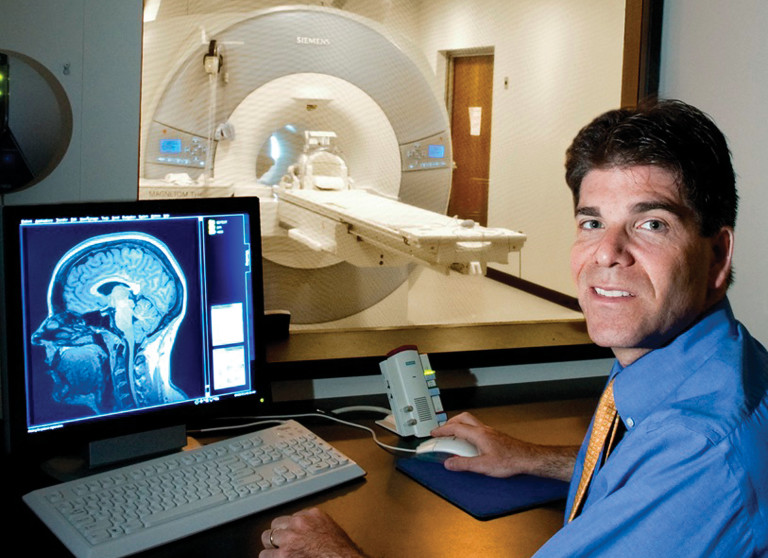Bipolar disorder is a devastating illness that can destroy relationships and undermine the ability to successfully manage school or work. It’s also often a contributing factor in substance abuse and suicide. Over the last decade, the number of children diagnosed with bipolar disorder has doubled, jumping from less than 10 percent to 20 percent. These figures are troubling for Dr. Daniel Dickstein ’89, who believes that the medical and psychiatric professions need to come up with a better set of protocols for diagnosing and treating kids with bipolar disorder.
As the head of the PediMIND (Pediatric Mood, Imaging and Neurodevelopment Program) research program at Brown University’s Bradley Hospital, Dan is using advanced medical imaging techniques, including MRI, to understand exactly what’s going on in the brains of kids with bipolar disorder and other mental illnesses. “Ultimately,” he said, the “goal is to develop better diagnostic tools and treatments that will help these kids.”
Dan started the PediMIND program in 2007 after moving back to Rhode Island after working as a researcher at the National Institute of Mental Health. At the NIMH, he was in the first wave of researchers to use MRI techniques to study physical changes in the brains of kids with mental illness. “I was hooked on the idea that you could do that kind of research to know what was going on inside kids’ heads,” he said.
When Dan returned to Brown in 2007, the timing was perfect: Bradley Hospital was looking to boost research in brain imaging and had recently opened a new neuroscience center, including a research-dedicated MRI. When Dan began using MRI to study children suffering from bipolar disorder, his research was on the cutting edge. “Nobody had imaged kids at all,” he recalled, “let alone kids with serious mental illness.”
The goal of Dan’s research is to understand what makes the brains of kids with bipolar disorder different from those with ADHD, anxiety, or no illness at all. From there, the goal is to develop a treatment that will help these kids. Specifically, PediMIND is investigating how specific cognitive processes, such as responses to changing rewards and setbacks, differ in kids with bipolar illness. Furthermore, Dan is investigating whether or not it’s possible to design a treatment that will literally change how these young people’s brains respond.
“The most inspirational thing to me is thinking about what [the medical profession has] done for kids with childhood cancer,” he explained. “In the 80s, childhood leukemia was a virtual death sentence. Now, the survival rate for childhood leukemia is over 90 percent. What happened? What happened was that parents, researchers, clinicians, and the people who fund research said ‘Enough — Let’s collect the data, understand the data, and use it to make more specific, better ways to diagnose things and make better, more specific treatments.’” Through his own research, Dan hopes to help his profession make similar strides with mental illness. “What guides my approach is that together we can make a powerful difference in kids’ lives,” he said. “We partner with parents and kids and clinicians and researchers to do these studies to transform childhood mental health care to improve our diagnosis and treatment.”
Looking back to his time at KCD, Dan says he’s grateful to the science teachers who nurtured his curiosity. “I’m grateful to a string of science teachers: Mr. Sorrell, Mrs. Mulligan, Mr. Molter, Mr. Jones, Mrs. Hendershot, Mrs. McGavic — really amazing folks. What I loved about KCD was that I was lucky enough to have the chance to explore my interests to the highest. I wanted to keep learning, and KCD allowed me to do that — to learn more and pursue those things I was interested in. I’m really grateful to KCD for those opportunities.”

